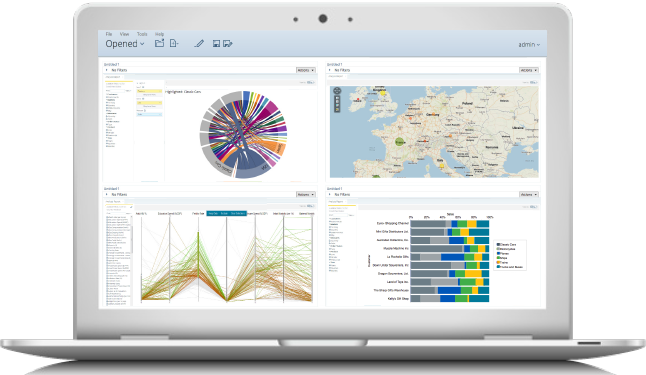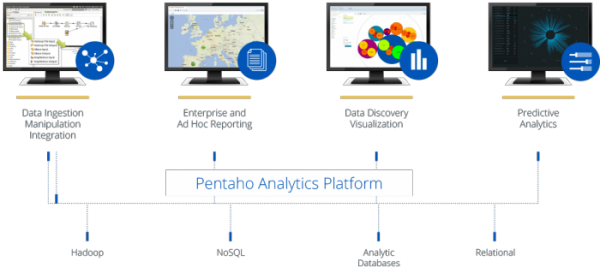
1. Being captain of your ship. Owning your future.
Having been around in IT for 30+ years as a software developer, consultant and business owner, I’ve bet the farm a few times on various vendor ‘stacks’. Eventually I came to realise it’s best to be future proof and not rely on any one vendor. Any open analytics tool that helps me abstract myself from hard choices and retains usefulness (a difficult combination by the way) is a good tool in my book.
Briefly, I was heavily vested in WANG solutions in the 1980s. Bad move as the whole hardware platform sunk under Chapter 11 (early stage bankrupcy). Then in Progress 4GL solutions in the 90s. Progress solved the ‘hardware reliance’ issue. However, I ended up with the same outcome as, while it is still around, to my mind, they were out-innovated by other tools and became somewhat obsolete for a future play. It wasn’t that either of these stacks were bad bets when first involved but by the time they started to fail me, I was too far invested to easily start again.
The lesson here is this: If you can pick platforms that insulate you from the evolving IT world, keep up with advances and give help prevent lock-in, you are in a better place for long term investment of money and effort.
I believe Pentaho with it’s mix of Community Edition and Enterprise Edition fulfils this in the Open Analytics space. You can evolve with its blend of support / speed in Enterprise and innovation from it’s open source roots. You can see the plugins added frequently to projects like Pentaho Data Integration as the open source world innovates with new data stores, techniques and APIs. This rapid innovation path is where I think businesses need increasingly to play.
2. Rapid innovation – keeping up.
First a definition. A stack vendor is a company that mostly innovates by buying smaller companies and adding their uniqueness to the ‘stack’. Examples include SAP, Oracle, IBM, Microsoft. When you choose a stack vendor you are locking into their world, they have a solution of sorts for every problem. There are likely better ones out there but theirs works with ‘the stack’. Once a stack vendor realises you are fully invested in their stack, your buying power and negotiation power decreases and their power over your future increases.
I firmly believe that stack vendors represent the past. Slowly but surely nimble, lighter and more flexible futures await even the slowest most protected organisations and businesses. If you look at the most ‘data aware’ innovative companies on the planet, they definitely have not bet the farm on a vendor stack and are more likely to go with the open analytics play – Pentaho figures prominently in this space.
Stack vendors make choices. They decide what’s best for your technology future by looking first at what’s best for their bottom line. Innovation often comes when they are forced into it. This happened in the 1990s when Microsoft discovered the Internet and tried initially to make it theirs. This happened to IBM when their customers left in droves in the 1980s and they were forced to innovate to a services model and explore less ‘lock-in’ based models.
Open means you are part of the innovation push. Things you read about you download, enable and do. You do not have to wait for your vendor to catch up, homogenise and explain it to you with their spin. Of course too bleeding edge can mean you burn hours and production implementations fail so it’s important to pick a partner that plays the game but tempers it with a commercial-reality tinge.
Take for example Pentaho, an open analytics firm Bizcubed represent in Australia and New Zealand. A large part of the innovation in the Open Analytics space at Pentaho comes from individuals at Universities, Colleges, Government, business organisations who have what’s called ‘an itch to scratch’. They build the initial innovation, plug it into the open architecture and share it with the community.
This is what helps Pentaho keep up with the rapid pace of innovation in analytics at the moment. Pentaho’s job is to secure, support, improve and document these community contributions. Basically to put the relevant layer of commercial reality on top of brilliant but rough-around the edges open source innovation.
This means Pentaho can offer the latest data sources, visualisations and other evolving capability far faster than their competitors. It’s just difficult to hire that many innovators in a stack vendor company as it affects your bottom line to much. You have to control the amount of innovation you invest in and therefore you have to ‘spin’ the innovations you skip as not relevant or not needed.
An example:
If you ask IBM what analytics database you should use, the answer is 99% likely to be ‘Netezza’. If you ask Microsoft they are likely to reply some variant of SQL-Server. Oracle will say Exadata. These products fit into the stacks they are offering and may or may not be your best option for your organisation.
If you ask Bizcubed what analytics database to use, we would offer you options, MonetDB (Open source), Vertica from HP is excellent, Infobright is great, Netezza is also good in certain situations, possibly SQL-Server. Perhaps we would mention other options like MongoDB, building aggregate tables. The point is, there are a lot of great options out there and an Open Analytics platform will not, by definition limit your organisation to one choice (the old adage here being Henry Ford’s initial colour choice being ‘They can choose any colour they want, as long as it’s black’).
In fact Pentaho will also make it very easy to switch.
Not following the innovation path provided by Open Analytics means your organisation will be potentially out-gunned, by more innovative firms that adopt and grow with innovation faster.
If you’re interested in a full-on study of innovation and how it’s affected the IT industry in particular, there is no better book than ‘The Innovators Dilemma’ by Professor Clayton Christensen of Harvard Business School.
3. Smart Mining for the ‘new oil’ – Data.
Specifically with regard to open analytics, this has been said far more eloquently than I’m capable of but to paraphrase. Data is the new oil1. A company that can harness the power of what their data is telling them is a company that is out-punching their competitors.
We’ve seen this with Amazon, we’ve seen this with Google, Facebook and all of the ‘data-saavy’ organisations.
They have the techs to build scalable, useful information insights that help them keep ahead in a very competitive world.
Open Analytics is where their innovations trickle first, products like Pentaho allow you to get closer to that pace of innovation and realisation than was even vaguely possible 5 years ago.
Every organisation, including the innovators, could be doing more with their data, could be adding value to their shareholders / stakeholders by rapidly building insights and operational data capability.
It’s the future, I think it’s time we all got on the bus. I’ll save a seat for you..

Zachary Zeus
Zachary Zeus is the Founder of BizCubed. He has more than 20 years' engineering experience and a solid background in providing large financial services with data capability. He maintains a passion for providing engineering solutions to real world problems, lending his considerable experience to enabling people to make better data driven decisions.


